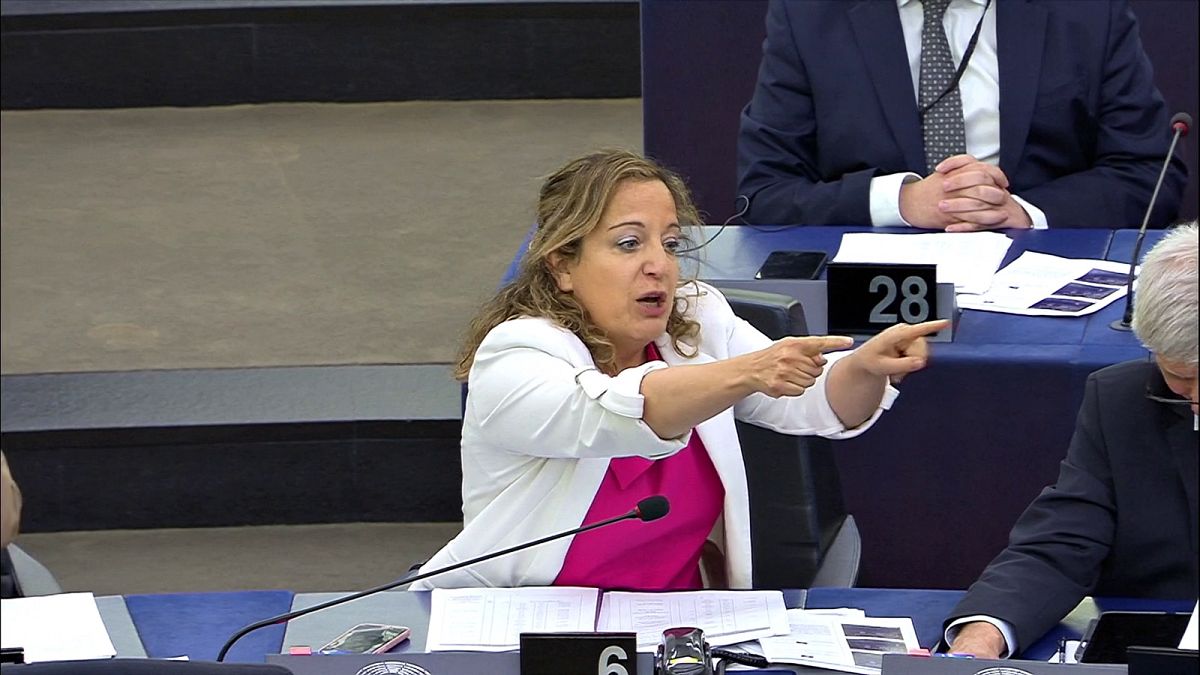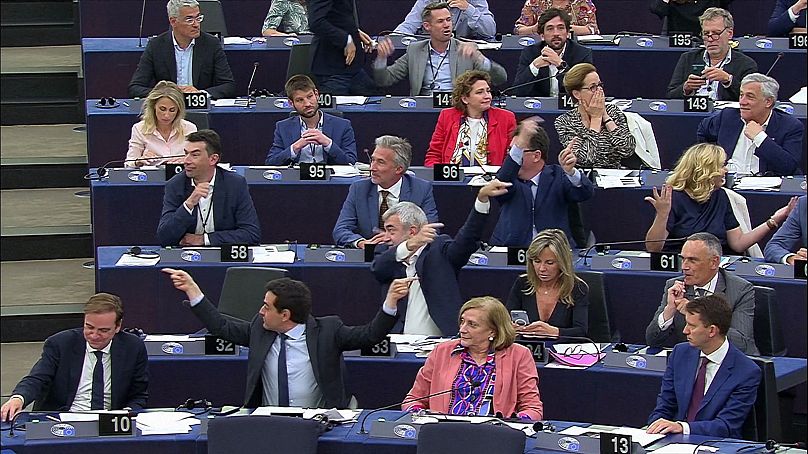A vote on the Emissions Trading System caused an unexpected domino effect of rejections and delays.
Chaos erupted in the European Parliament on Wednesday as the scheduled votes on three key climate laws were postponed over last-minute political disagreements.
The trouble began with a vote to reform the EU's Emissions Trading System (ETS), a well-established scheme that sets a price for the greenhouse gas emissions released by the most energy-intensive industries.
The ETS is considered a key tool to gradually decrease the burning of fossil fuels and encourage the deployment of renewable energy.
MEPs had drafted an initial report about the ETS reform in the parliament's environmental committee.
Among the changes was the creation of a new ETS that would target the emissions coming from road transport and buildings, which many lawmakers feared would hit struggling households. In their text, MEPs decided the system would exempt private buildings and private transport until 2029.
The report received an ample margin of support in the environmental committee, a consensus that was expected to be replicated in the full hemicycle.
But as several amendments put forward by the socialists began to be struck down, one after the other, Iratxe García, the group's leader, asked for a short interruption before the final vote.
"If not, we'll vote against!" García was heard shouting to their peers, who complained about the pause. The socialists then gathered on the stairs to discuss their next move.
"I think the three big minutes are up," said Roberta Metsola, the president of the European Parliament.
Metsola opened the floor for the final vote and revealed the ETS proposal had been surprisingly rejected by 340 votes against and 265 votes in favour, with 34 abstentions.
The result prompted cheers from the socialists and greens, who had pushed for higher climate goals, and boos from the centre-right European People's Party (EPP) and the liberal Renew Europe, who had thrown their support behind the report.
MEPs were seen pointing fingers at each other, trading accusations.
"It's a bad day for the European Parliament," said Pieter Liese, an EPP lawmaker who acted as rapporteur of the ETS reform.
Liese was immediately cut off by jeers, forcing Metsola to intervene and demand silence.
"I think it's a shame that the far-right and the Socialist and the Greens have voted together," Liese said. "Democracy means to respect the Parliament and to have a reduction of the damage, to give it a second try. All those who voted against today can think twice. Please don't kill the ETS."
Liese then requested the ETS file to be referred back to the environmental committee in a bid to reach a new compromise and bring it back to the hemicycle, possibly after the summer.
The request was accepted by his colleagues.
Philippe Lamberts, a Belgian MEP who co-chairs the Greens, said his group was willing to work together with the EPP and the other "pro-European parties" to craft a new compromise.
"Pro-European majorities in this chamber don't automatically mean a green-socialist majority," replied Manfred Weber, the EPP chief, who was also met with booing and jeering.
"The reality is that Greens and Socialists voted with the far-right against the proposal of the majority in this parliament. Don't change history, that's not fair," he added.
On behalf of the liberals, Stéphane Séjourné said his group shared the ambition of the Greens but made a "tactical choice" to avoid voting with the far-right against the ETS reform.
The far-right Identity and Democracy (ID) group is generally opposed to any measure that strengthens climate targets. The eurosceptic European Conservatives and Reformists (ECR) group, which rejects the far-right label, often defends a sceptical position when it comes to the European Green Deal.
"I think it's important that we lower the temperature," said Iratxe García, who many saw as the main disruptor of Wednesday's session. "We are going to take [the ETS report] back to the committee and use that time to try to build a coherent common position. Let's not put out traps."
García admitted the rejection of her group's "ambitious" amendments was the reason behind the U-turn. She then approached Manfred Weber for a face-to-face discussion, which the microphones did not register.
"Now that everybody is calm, do we go to the next file?" asked President Metsola.
But the rejection of the ETS report caused a domino effect, bringing down two other key votes: one on the Social Climate Fund, which would be partially financed by revenues obtained from selling ETS permits, and another on the Carbon Border Adjustment Mechanism (CBAM), a tax on polluting imports that try to enter the single market.
MEPs considered the three files to be too interlinked to be voted separately. The trio will go back to discussions at committee level before a new compromise is put forward to the whole chamber.
The three legislative proposals are part of Fit For 55, a far-reaching and transformative package of 13 draft laws that the Commission unveiled last year to slash the bloc's carbon emissions by at least 55% before the end of the year and comply with the Paris Agreement goals.
The legislation has to be approved by the European Parliament and the EU Council, a negotiation process that is expected to be fraught and intense, as previewed by Wednesday's chaotic vote.
In a second part of voting that took place several hours after the brawl, MEPs endorsed a Commission's proposal to end sales of new combustion-engine vehicles by 2035, striking down an EPP amendment that tried to delay the phase-out.

